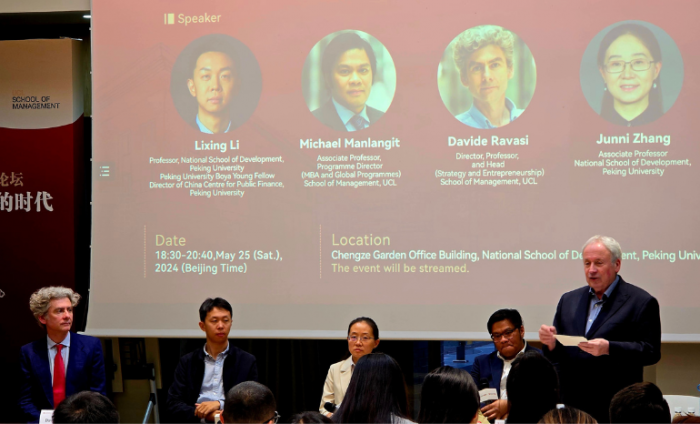PKU-UCL MBA PANEL FORUM: ARTIFICIAL INTELLIGENCE AND OUR NEW ERA
May 29-2024


On Saturday 25 May, the National School of Development at Peking University takes pride in having facilitated a profound discussion on the topic "Artificial Intelligence and Our New Era" (人工智能与我们的新时代). Professor Lixing Li and Professor Junni Zhang from Peking University, were joined by Professor Davide Ravasi and Associate Professor Michael Manlangit from the UCL School of Management. The dialogue was expertly moderated by Professor Alan Parkinson, also from the UCL School of Management.
The panelists provided diverse perspectives on the current state of AI, its potential trajectory, and the ethical considerations surrounding its application.
The considerations started with an overview of observations on the benefits and concerns about AI, and how we might work with it to advantage.
Employment Implications: Professor Lixing Li delved into his research on the current and potential future impacts of AI on employment across various industry sectors and careers. While some audience members had beaming smiles concerning career security and opportunities, others had raised eyebrows.
Urban Planning and AI: Professor Michael Manlangit blended his urban planning research with how AI is being used to speed up the urban planning process. A process which has traditionally been time consuming and costly. In so doing, he distinguished between AI’s use as an analytical tool and a decision-making aid, prompting reflection: would we be happy to leave decisions in the literally virtual hands of AI?
Tackling Bias and Discrimination: Professor Junni Zhang continued the analytical theme, highlighting bias in finance, banking, and recruitment sectors, emphasising the need for ethical AI practices.
Academic Integrity: Professor Davide Ravasi explored the mix of beneficial uses and dangers of using generative AI in educational assessments and scholarly research and publications. He outlined the challenges facing the education sector and academia, proposing how educators and students might work together to enjoy the fruits of AI whilst preserving academic integrity. He concluded with an interesting thought: if we allow generative AI to replace human critical thinking, we may end up with a concentration of mediocrity, to the detriment of all.
The panel was followed by an engaging and informative presentation on the UCL-PKU MBA by Kelvin Bin Yu to prospective MBA students. Kelvin is Assistant Dean, BiMBA (Beijing International MBA), and Director of MBA Center & Career Development Department.







